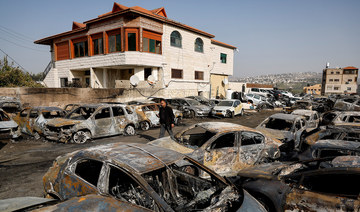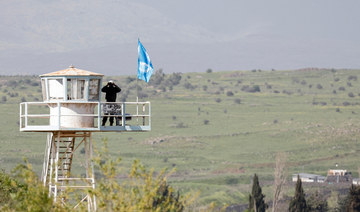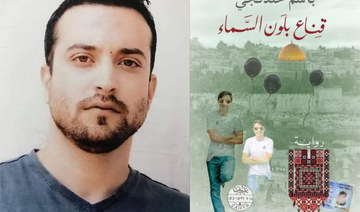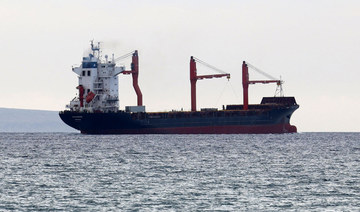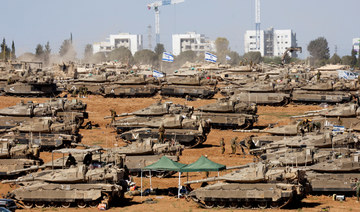TEL AVIV: Weeks of anti-government protests in Israel turned violent on Wednesday for the first time as police fired stun grenades and a water cannon at demonstrators who blocked a Tel Aviv highway. The crackdown came shortly after Israel’s hard-line national security minister urged a tough response to what he said were “anarchists.”
The violence came as thousands across the country launched a “national disruption day” against the government’s plan to overhaul Israel’s judicial system.
Prime Minister Benjamin Netanyahu’s allies say the program is meant to reduce the influence of unelected judges. But critics, including influential business leaders and former military figures, say Netanyahu is pushing the country toward authoritarian rule and has a clear conflict of interest in targeting judges as he stands trial on corruption charges.
Since Netanyahu’s government took office two months ago, tens of thousands of people have taken to the streets to protest the changes, which they say endangers Israel’s fragile system of checks and balances. Wednesday, however, marked the first time police used force against the crowds.
The government is barreling ahead with the legal changes and a parliamentary committee is moving forward on a bill that would weaken the Supreme Court.
The crisis has sent shock waves through Israel and presented Netanyahu with a serious challenge. A wave of Israeli-Palestinian violence in the occupied West Bank has compounded his troubles.
The rival sides are digging in, deepening one of Israel’s worst domestic crises. Netanyahu and his government, made up of ultranationalists, have branded the protesters anarchists, while stopping short of condemning a West Bank settler mob that torched a Palestinian town earlier this week.
The legal overhaul has sparked an unprecedented uproar, with weeks of mass protests, criticism from legal experts and rare demonstrations by army reservists who have pledged to disobey orders under what they say will be a dictatorship after the overhaul passes. Business leaders, the country’s booming tech sector and leading economists have warned of economic turmoil under the judicial changes. Israel’s international allies have expressed concern.
In the first scenes of unrest since the protests began two months ago, police arrived on horseback in the center of the seaside metropolis of Tel Aviv, hurled stun grenades and used a water cannon against thousands of protesters who chanted “democracy” and “police state.” A video posted on social media showed a police officer pinning down a protester with his knee on the man’s neck and another showed a man who reportedly had his ear ripped off by a stun grenade.
Facing the police, protesters also chanted “where were you,” a reference to the absence of security forces during the settler attack on the Palestinian town of Hawara, which took hours to quell and which the military said it was not prepared for.
Police said protesters threw rocks and water bottles at the officers. Police said they arrested 39 protesters in Tel Aviv for disturbing the peace while 11 people were hospitalized with various injuries, according to Tel Aviv Sourasky Medical Center. Earlier Wednesday, protesters blocked Tel Aviv’s main freeway and the highway connecting the city to Jerusalem, halting rush hour traffic for about an hour. At busy train stations in Tel Aviv, protesters prevented trains from departing by blocking their doors.
National Security Minister Itamar Ben-Gvir, an ultranationalist accused of politicizing the police, has vowed to take a tough line. He called on police to prevent the road blockages, labeling the demonstrators “anarchists.”
Netanyahu said Ben-Gvir had his full support. “We will not tolerate violence against police, blocking roads and blatant breaches of the country’s laws. The right to protest is not the right to anarchy,” he said.
Netanyahu also blamed opposition leader Yair Lapid for fomenting anarchy. Lapid called on police to show restraint and said Netanyahu’s government had lost control.
“The protesters are patriots,” Lapid tweeted. “They are fighting for the values of freedom, justice and democracy. The role of the police is to allow them to express their opinions and fight for the country they love.”
Thousands of protesters came out in locations across the country waving Israeli flags. Parents marched with their children, tech workers walked out of work to demonstrate and doctors in scrubs protested outside hospitals. The main rallies were expected later Wednesday outside the Knesset, or parliament, and near Netanyahu’s official residence in Jerusalem.
“Every person here is trying to keep Israel a democracy and if the current government will get its way, then we are afraid we will no longer be a democracy or a free country,” said Arianna Shapira, a protester in Tel Aviv. “As a woman, as a mother, I’m very scared for my family and for my friends.”
Justice Minister Yariv Levin, the overhaul’s main architect, said Tuesday that the coalition aims to ram through some of the judicial overhaul bills into law in the coming month, before the parliament goes on recess for the Passover holiday on April 2.
The Knesset also is set to cast a preliminary vote Wednesday on a separate proposal to protect Netanyahu from being removed from his post, a move that comes following calls to the country’s attorney general to declare him “unfit for office.”
Netanyahu has been the center of a years-long political crisis in Israel, with former allies turning on him and refusing to sit with him in government because of his corruption charges. That political turmoil, with five elections in four years, culminated in Netanyahu returning to power late last year, with ultranationalist and ultra-Orthodox parties as partners in the current far-right government.
Wielding immense political power, those allies secured top portfolios in Netanyahu’s government, among them Ben-Gvir, who before entering politics was arrested dozens of times and was once convicted of incitement to violence and support for a terror group. Finance Minister Bezalel Smotrich, a firebrand West Bank settler leader, has been given authority over parts of the territory.
They have promised to take a tough stance against Palestinians, which has ratcheted up tensions in recent weeks. Smotrich publicly called for a harsh response to the killing of two Israelis in the West Bank by a Palestinian gunman, saying Israel should “go crazy,” shortly before Sunday’s mob violence. While he later urged restraint, he also said Wednesday that Hawara, the Palestinian town that was attacked, should be “erased.”
In addition to the protests, Netanyahu’s government, Israel’s most right-wing ever, is beginning to show early cracks, just two months into its tenure.
The government says the legal changes are meant to correct an imbalance that has given the courts too much power and allowed them to meddle in the legislative process. They say the overhaul will streamline governance and say elections last year, which returned Netanyahu to power with a slim majority in parliament, gave them a mandate to make the changes.
Critics say the overhaul will upend Israel’s system of checks and balances, granting the prime minister and the government unrestrained power and push the country toward authoritarianism.
Israeli police crack down, clash with anti-Netanyahu protest
https://arab.news/2t8tj
Israeli police crack down, clash with anti-Netanyahu protest
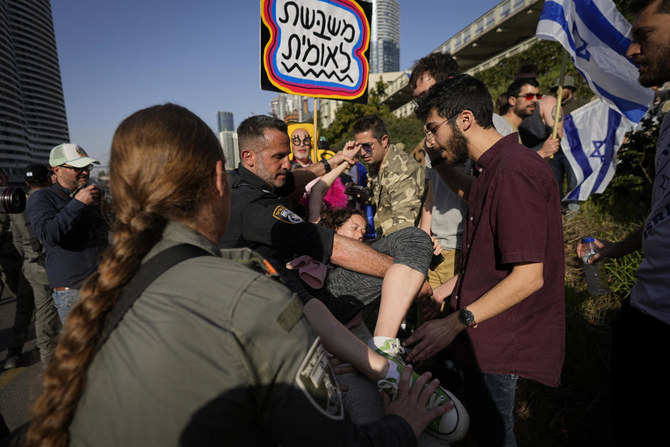
- Israel’s hard-line national security minister urged a tough response to what he said were “anarchists"
Israel to abolish free trade deal with Turkiye in retaliation

- Earlier this month, Turkiye said it was stopping exports to Israel during the duration of the Israel-Hamas war
JERUSALEM: Israeli Finance Minister Bezalel Smotrich on Thursday said Israel would abolish its free trade agreement with Turkiye and also impose a 100 percent tariff on other imports from Turkiye in retaliation for Turkish President Tayyip Erdogan’s decision to halt exports to Israel.
The plan, he said, would be submitted to the cabinet for approval.
Earlier this month, Turkiye said it was stopping exports to Israel during the duration of the Israel-Hamas war, citing “worsening humanitarian tragedy” in the Palestinian territories. But the Turkish Trade Ministry has said that companies have three months to fulfil existing orders via third countries.
“His (Erdogan’s) announcement of the stoppage of imports to Israel constitutes a declaration of an economic boycott and a serious violation of international trade agreements to which Turkiye has committed,” Smotrich said in a statement.
He noted that Israel’s actions would only last as long as Erdogan remained in power.
“If at the end of Erdogan’s term the citizens of Turkiye elect a leader who is sane and not a hater of Israel, it would be possible to return the trade route with Turkiye,” Smotrich said.
Under Smotrich’s plan, all the reduced customs rates applicable to goods imported from Turkiye to Israel according to an agreement to the free trade deal would be abolished. At the same time, a duty would be imposed on any product imported from Turkiye to Israel at a rate of 100 percent of the value of the goods in addition to the existing duty rate.
The finance, economy and foreign ministries, the statement said, would also take steps to strengthen Israel’s manufacturing while diversifying sources of import to reduce the dependency on Turkiye.
Israel’s Manufacturers’ Association called Smotrich’s plan “an appropriate response” for not allowing Erdogan to damage the economy without a response.
Measured support for end of UN mission in Iraq

UNITED NATIONS: Several members of the UN Security Council, including Russia and China, on Thursday backed Baghdad’s request for the world body’s political mission in Iraq to shut down by next year — but Washington did not immediately offer its support.
Last week, in a letter to the council, Iraqi Prime Minister Mohamed Shia Al-Sudani called for the United Nations Assistance Mission for Iraq (UNAMI), which has been operational since 2003, to end by December 31, 2025.
Iraq’s deputy UN envoy Abbas Kadhom Obaid Al-Fatlawi reiterated the request before the council on Thursday, saying: “The mission has achieved its goals.”
Russian envoy Vasily Nebenzia shared that view, saying “Iraqis are ready to take responsibility for the political future of their country.”
“The remaining problems should not become an excuse for UNAMI to stay in the country indefinitely,” he added.
Within the framework of the mission’s annual renewal, due at the end of May, the council should “propose a plan... in order to ensure its gradual drawdown and smooth transition toward an ultimate withdrawal,” noted China’s deputy UN envoy Geng Shuang.
Given that UN missions can only operate with the host nation’s consent, Britain and France also voiced support for a transition in the partnership between Iraq and the UN.
The US was more vague, with ambassador Linda Thomas-Greenfield saying UNAMI still had “important work to do,” and making no mention of Baghdad’s request.
She emphasized the mission’s key role on several important political issues, such as support for organizing elections and promoting human rights, even though Iraq has clearly asked that the mission focus more squarely on economic issues.
In an evaluation requested by the council, German diplomat Volker Perthes said in March that UNAMI, which had more than 700 staff as of late 2023, “in its present form, appears too big.”
Perthes called on the mission to “begin to transition its tasks to national institutions and the United Nations country team in a responsible, orderly and gradual manner within an agreed time frame.”
Without commenting on Baghdad’s request, mission chief Jeanine Hennis-Plasschaert painted a picture of an Iraq that “looks different to the country to which UNAMI was first deployed some 20 years ago.”
“Today we are, so to speak, witnessing an Iraq on the rise,” she said, while noting multiple challenges yet unresolved, such as corruption and armed groups operating outside state control.
But she added: “I do believe it is high time to judge the country on progress made, and to turn the page on the darker images of Iraq’s past.”
ICRC officials to meet UK Foreign Office over plan for Palestinian detainees

- David Cameron reportedly negotiated deal with Israel’s government to allow two British legal observers and Israeli judge to visit some prisoners
LONDON: Officials from the International Committee of the Red Cross will hold talks with the UK Foreign Office over concerns about British plans to visit Palestinian detainees in Israeli jails.
Foreign Secretary David Cameron has reportedly negotiated a deal with Israel’s government to allow two British legal observers and an Israeli judge to visit some prisoners being held in Israeli prisons amid reports of “inhumane treatment,” The Guardian reported on Thursday.
In an interview with the BBC at the weekend, Cameron said he had spoken to Israeli Prime Minister Benjamin Netanyahu about the issue.
“It’s not all bleak ... I said it (the lack of access to detainees) was not good enough, that we needed to have a proper independent system for inspecting and regulating, and the Israelis have announced they are now doing that,” he said.
Netanyahu’s government has blocked ICRC staff from having any access to Palestinian detainees since the Hamas-led attack on Oct. 7. It has said the block will remain until Hamas allows access to Israeli hostages taken during the attack.
Critics say this stance could constitute a breach of the Geneva Conventions, with the ICRC having made repeated requests to both sides in the conflict to allow access to all those detained, as set out in the conventions.
Observers have also raised concerns that the UK plan will “weaken the rule of law” and could set a “dangerous precedent” for how detainees are treated in other conflict zones, The Guardian report added.
The ICRC’s director for the Middle East region, Fabrizio Carboni, is in London to hold talks with Foreign Office officials.
In a statement to The Guardian, the aid organization said Palestinian detainees must be treated as protected persons with access to the ICRC, as proscribed under the Geneva rules.
The statement added: “We have seen the reports of a government of Israel decision to allow observers to visit some places of detention. The ICRC remains hopeful that suitable steps are taken that could protect the health and welfare of detainees, which remains paramount. We reiterate our readiness to resume our mandated detention activities.”
Arab News columnist and director of the Council for Arab-British Understanding, Chris Doyle, said the Foreign Office plan risked establishing a system that bypassed the ICRC and internationally accepted regulations.
“There is no transparency about Cameron’s alternative … I very much doubt that two Foreign Office-appointed lawyers in the company of a judge from the occupying power are going to have the expertise of the ICRC, but will instead be taken around sanitised prisons,” he said.
“What has happened to the thousands of Palestinians taken from Gaza to Israel is a huge issue. (Neither) we nor their families know where they are, whether they are combatants or children, or why in some cases they are being stripped to their underpants. We have heard nothing from the UK government about this,” he added.
During a week-long truce between Hamas and Israeli forces in November, the ICRC played an active role in facilitating the swap of 105 Israeli hostages held by Hamas and 240 Palestinian prisoners from Israeli jails.
Residents cower as fighting picks up in Sudan’s Al-Fashir

CAIRO/DUBAI: Residents are fleeing missile fire and sheltering without food and water amid escalating fighting in the Sudanese city of Al-Fashir, witnesses and aid workers said, adding to fears of an all-out battle.
The city is the Sudanese army’s last stronghold in the western Darfur region. Its capture would be a major boost for the rival Rapid Support Forces (RSF) as regional and international powers try to push the sides to negotiate an end to a 13-month war.
Locals and aid workers fear the clashes could also lead to a new round of bloodletting after ethnically-driven violence blamed on the RSF and its allies elsewhere in Darfur last year.
Many of Al-Fashir’s 1.6 million residents arrived during the violence between Arabs and non-Arabs that killed hundreds of thousands of people in the early-2000s. The RSF’s origins lie in the Arab janjaweed militias accused of ethnic cleansing and genocide then.
In recent weeks the RSF has almost surrounded Al-Fashir, capital of North Darfur state, while soldiers from the army and allied non-Arab armed groups fill the city.
In a sign of mounting ethnic tensions, Mini Minnawi, head of one of the groups, said on X he had made a wide call for fighters to come and defend Al-Fashir, in response to what he said was a similar call by the RSF.
Al-Fashir residents report snipers, stray missiles and army air strikes causing fires in the east and north of the city. Many civilians have taken up arms.
“The situation in the city has been difficult the past few days. Missiles from both sides are falling inside neighborhoods and homes, and getting to hospitals is dangerous,” said 38-year-old resident Hussein Adam.
Medical aid agency MSF said on Thursday that the city’s South Hospital had seen 489 casualties since May 10, including 64 deaths, though it said the real toll was far higher.
Another hospital it supports, which saw 27 people killed last weekend, was forced to shut down after an army air strike 50 meters away, MSF said.
The RSF and army blame each other for the violence.
On Wednesday, the United States imposed sanctions on two top RSF commanders, including the force’s head of operations, for the attacks on Al-Fashir.
“We are prepared to take further action against those who actively escalate this war – including any offensive actions on El Fasher – create barriers to humanitarian access, or commit atrocities,” US ambassador to the United Nations Linda Thomas-Greenfield posted on X.
Experts have raised warnings of impending famine in the displacement camps that dot Al-Fashir. The city also suffers from water shortages, network outages, and high prices.
In one of those camps, Abu Shouk in the north of the city, nine people were killed by stray missiles, camp leaders said on Sunday.
Residents say displaced people from eastern neighborhoods are sheltering under trees and in open squares.
“Most families have moved west, women and children with nothing to eat or drink,” said resident Mohamed Jamal, a volunteer with the local emergency response room.
The army has so far insisted that international aid delivered via Chad for other parts of Darfur pass through Al-Fashir, something that the escalating violence prevents.
Carl Skau, Chief Operating Officer of the World Food Programme, said the agency had trucks ready in the Chadian border town of Tina, but they needed to be able to move soon.
“The window is closing, the rains are coming and we need action in the next couple of weeks,” he told Reuters after a trip to Port Sudan where he tried to negotiate with the army for better access this week.
The UN’s World Food Programme expects more people are being driven to the brink of starvation in other parts of Sudan worst affected by the war including the capital Khartoum, El Gezira state and the Kordofan regions.
“We really need to step up a concerted effort to avoid an even worse catastrophe,” Skau said.
US military says aid pier anchored to Gaza beach

- The US Central Command said the pier was “successfully affixed to the beach in Gaza” with around 500 tons of aid expected to enter the Palestinian territory in the coming days
- “It’s a pretty substantial amount, and it’s spread out over multiple ships right now,” Vice Admiral Brad Cooper, deputy CENTCOM commander, told reporters
JERUSALEM: US troops on Thursday anchored a long-awaited temporary pier aimed at ramping up emergency aid to a beach in the war-ravaged Gaza Strip, the US military and Israel said.
The US Central Command said the pier was “successfully affixed to the beach in Gaza” with around 500 tons of aid expected to enter the Palestinian territory in the coming days.
“It’s a pretty substantial amount, and it’s spread out over multiple ships right now,” Vice Admiral Brad Cooper, deputy CENTCOM commander, told reporters in Washington.
Israel’s military also said in a statement that the connection was “successfully completed.”
But Farhan Haq, a spokesman for UN Secretary-General Antonio Guterres, said negotiations remained ongoing on distribution of the aid — particularly on the safety of workers.
“We are finalizing our operational plans to make sure that we’re ready to handle it once the floating dock is properly functioning, while ensuring the safety of our staff,” he said.
The Gaza war has been devastating for aid workers. The UN agency for Palestinian refugees, UNRWA, which Israel accuses of bias, has alone lost 188 Gaza staff, according to UN figures.
Asked about the concerns, State Department spokesman Vedant Patel said the United States was working with the United Nations on practicalities but added: “From our point of view, we believe that this is ready to go and for aid to start flowing as soon as possible.”
US President Joe Biden announced the emergency pier in March to address the humanitarian crisis in Gaza, where the United Nations has warned of famine with virtually the entire population of 2.4 million displaced by the Israeli military action in response to the October 7 Hamas attack.
Built at a cost of at least $320 million, the project is extraordinary in that such massive humanitarian efforts by the United States are usually in response to actions by hostile countries, not a US ally.
The humanitarian assistance is being screened in Cyprus and loaded by truck. Once on land, it will “move quickly,” being offloaded from the coast into Gaza within hours, Cooper said, adding that “thousands of tons of aid are in the pipeline.”
He said that around 1,000 US soldiers and sailors were involved in the operation but that they would not take part in delivery, which will be led by the UN.
The war began after Hamas’s October 7 attack on southern Israel, which resulted in the deaths of more than 1,170 people, mostly civilians, according to an AFP tally of Israeli official figures.
Israel’s military retaliation has killed at least 35,272 people, also mostly civilians, according to the health ministry in the Hamas-run Gaza Strip.
The UN has argued that opening up land crossing points and allowing more trucks convoys into Gaza is the only way to stem the spiralling humanitarian crisis.
But the primary crossing into Gaza, on the territory’s border with Egypt, has been closed for days.
Israeli troops took over the Palestinian side of the crossing last week as the military threatened a wider assault on the southern city, defying warnings from the United States and others over the fate of some 1.4 million civilians who had been sheltering there.
“Of course we’re thankful to the US for all the work they’ve done in creating the floating dock. However, getting aid to people in need into and across Gaza cannot and should not depend on a floating dock far from where needs are most acute,” Haq said.
Cyprus, the Mediterranean island nation that is the departure point for aid on the planned maritime corridor, said US ship James A. Loux left Wednesday, carrying relief supplies and technical equipment.
Government spokesman Konstantinos Letymbiotis said that “new departures are expected, transporting humanitarian aid including food items, medical supplies, hygiene and temporary shelter.”
Britain, meanwhile, said its initial contribution of nearly 100 tons of “shelter coverage kits” figured in the first shipment.
The pier will begin with facilitating the delivery of around 90 truckloads of international aid into Gaza each day, before volumes are scaled up to 150 truckloads daily, a British statement said.




